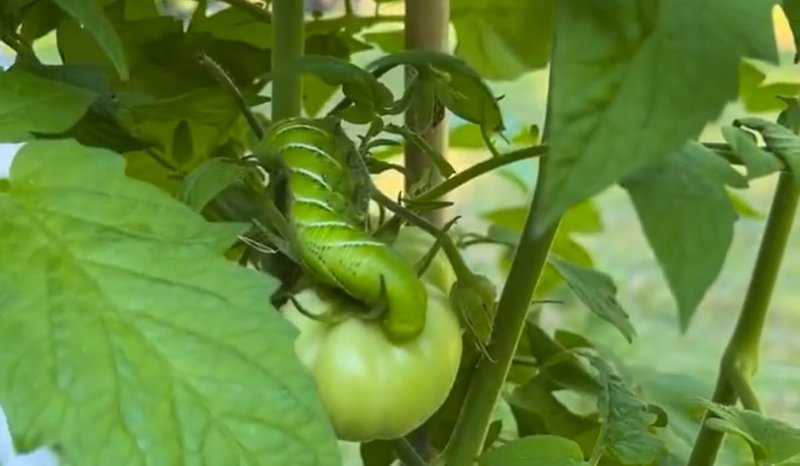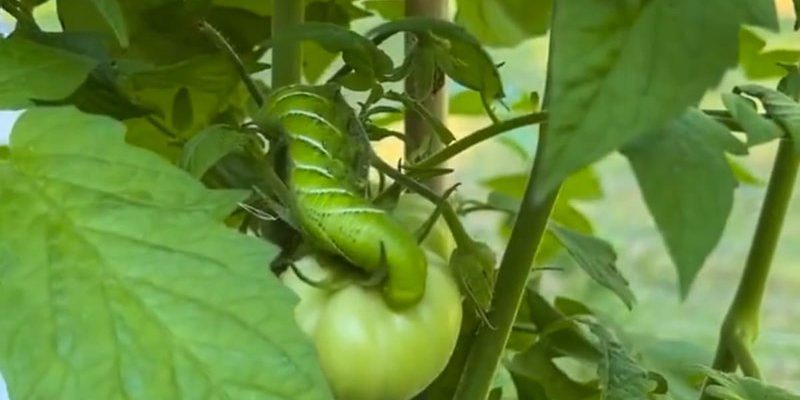
Hydroponic systems, like the popular Kratky method or deep water culture, offer an innovative way to grow tomatoes without soil. They provide nutrients directly to the plants through water, ensuring they get everything they need to flourish. But just like any garden, these systems can attract pests. So, while you’re busy nurturing your plants, you might also need to think about the pesky critters like hornworms.
What Are Hornworms?
Hornworms, specifically the Manduca sexta, are the larvae of hawk moths. These caterpillars can reach about 3–4 inches in length and have a distinct horn-like projection on their rear. They blend in so well with the tomato leaves that spotting them can be quite the challenge. The truth is, they love to munch on tomato plants, devouring leaves, stems, and even fruits. If you’ve ever found your vibrant green plants suddenly looking ragged, a hornworm might be the culprit.
You might be wondering why these little monsters are a big deal. Well, hornworms can do extensive damage in a short amount of time. One hornworm can eat a significant portion of a tomato plant in just a few days! Their voracious appetite can quickly turn a healthy crop into a sad shadow of its former self.
If you’re growing tomatoes hydroponically, you might think you’re safe from pests, but hornworms can still find a way in. They can be introduced on seedlings or even in the air. It’s essential to stay vigilant and check your plants regularly to catch any hornworms early before they wreak havoc.
How Hornworms Affect Hydroponic Tomato Systems
In hydroponic systems, nutrient delivery is key to growth. When hornworms attack, they don’t just damage the leaves—this can impact the entire plant’s health. With fewer leaves, the plant has less surface area to absorb sunlight, which means it won’t photosynthesize efficiently. Reduced photosynthesis can lead to stunted growth and fewer tomatoes.
Furthermore, hydroponic systems rely on balanced nutrient solutions, and if the plants are not thriving, it could throw the pH balance off as well. Over time, this can create a chain reaction affecting other plants in the system. So, if you notice your tomatoes are under attack, it’s not just the tomato plant that suffers; the whole setup can feel the effects.
Another consequence is the potential for disease. Damaged plants are more susceptible to infections and pests. If hornworms leave behind eggs or droppings, it can introduce bacteria or fungi that further endanger your entire crop. So, it’s critical to address hornworm issues promptly.
Identifying Hornworms in Your Hydroponic Garden
To effectively deal with hornworms, you first need to spot them. Here are some signs that hornworms might be munching on your precious tomato plants:
- Chewed Leaves: Look for irregular holes or missing leaf sections.
- Frass: This is a fancy word for caterpillar droppings. If you find little green specks on or around your plants, that’s a sure sign.
- Green Caterpillars: They’re masters of disguise, so check the undersides of leaves. Their green color helps them blend in.
Once you notice any of these signs, it’s time to take action. You might want to grab a flashlight and inspect your plants, especially during evening hours when hornworms are more active. If you find one, carefully remove it by hand—don’t squish it, as they can still cause messes even after they’re dead.
How to Control Hornworms in Hydroponic Systems
Controlling hornworms in your hydroponic setup can be tackled in a couple of ways. Here are some effective strategies:
1. Hand-Picking
This is one of the simplest methods. If you catch them early, simply grab them and dispose of them correctly. Just be careful and wear gloves if you prefer, as some people find them a bit squirmy.
2. Use Neem Oil
Neem oil is a natural pesticide that disrupts the life cycle of caterpillars. It can be a useful ally against hornworms. Mix it according to the instructions and spray it on your tomato plants. Honestly, it’s a good idea to apply it in the early morning or late evening to avoid harming beneficial insects.
3. Introduce Beneficial Insects
Ladybugs and lacewings can help keep hornworm populations in check. They munch on various pests and can reduce the chances of an infestation taking over. Just make sure your hydroponic system can accommodate these tiny helpers!
Preventing Hornworms in Your Tomato Hydroponics
The best offense is a good defense! Here are some practical tips to prevent hornworms from making themselves at home in your hydroponic system:
- Regular Inspections: Check your plants often for signs of hornworms or other pests.
- Cleanliness: Keep your gardening area tidy. Remove dead leaves and debris that might attract pests.
- Companion Planting: Consider planting flowers such as marigolds nearby. They can deter pests, including hornworms.
By staying proactive, you can help prevent these pesty invaders from munching on your tomatoes. Plus, when your plants are healthy and thriving, it makes harvesting those juicy fruits even more rewarding!
Alternative Pest Control Methods
If you’re looking for additional pest control methods, there are a few more options to consider:
1. Bacillus thuringiensis (Bt)
This is a natural bacterium that specifically targets caterpillars like hornworms. It’s safe for humans and pets but deadly for pests. You can apply it as a spray to your affected plants.
2. Insecticidal Soap
This can be effective against a variety of pests, including hornworms. Just be careful to apply it when the sun isn’t too strong, as it can burn the leaves.
3. Diatomaceous Earth
Sprinkling this fine powder around the base of your plants can deter pests. It works by dehydrating them when they come into contact with it.
Whichever method you choose, the key is to maintain a consistent approach.
Hornworms can be a real nuisance for anyone growing tomatoes, especially in hydroponic systems. By understanding their habits and knowing how to control them, you can keep your plants healthy and productive. Remember to regularly check your tomatoes, consider using natural pest control methods, and maintain a clean gardening space to prevent infestations.
With a little diligence and care, you can enjoy a bountiful harvest without the stress of hornworms ruining your tomato dreams. Just like a good meal requires attention and care, so does your hydroponic garden. Happy growing!

